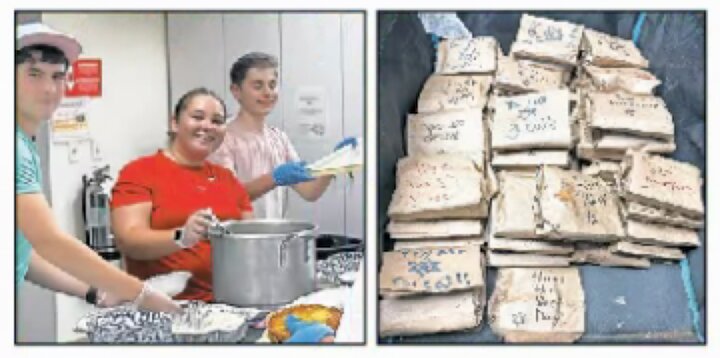Call to action: SAR team aids Arizona migrants
Five rising seniors at SAR in Riverdale heard a call to action in a speech by Rabbi Dr. Shmuly Yanklowitz. They answered the call and traveled to Phoenix in August to help asylum seekers acclimate to life in the United States.
“We’ve been blown away by the commitment of the SAR students who have visited us near the border,” says Rabbi Yanklowitz, founder and president of Uri L’Tzedek: The Orthodox Social Justice Movement. “These students have big questions, rigorous discipline, and a real passion for serving. … [They] understand that our particularistic commitments are intertwined with our universalistic commitments, that we must build Am Yisrael and also work for the betterment of society and stand up for the most vulnerable.”
Chavez Calderon, campaign director and former migrant, said he was inspired by “the overwhelming amount of compassion and drive of SAR students who have visited to support vulnerable populations.”
“They could have been doing literally anything else and yet they chose to fly across the country and fight the heat to provide food and aid to migrant families. It was also moving to see the students use their Jewish ethics as a grounding for why they are helping strangers. As a former undocumented migrant, it meant the world to me to have them save lives with me.”
Each student had a personal moment of reflection while hearing the stories of migrants who crossed nations to seek refuge here. They listened to women from Ecuador and Colombia who traveled thousands of miles through jungles and rivers, and to men from Senegal and Uganda who traveled to Mexico then to the US to embark on new lives.
“Having the opportunity to connect with and help people from different parts of the world, learning about their cultures and attempting to speak to them in their native languages was an experience we knew we wouldn’t get anywhere else,” says Harrison Brooks of Riverdale. “It was meaningful to me and to the migrants when I attempted to speak bits of French and Spanish to them, as experiencing their languages gave them a sense of familiarity in an unfamiliar place.”
“No matter one’s political opinion, the experience was incredible,” said Adam Burian of New Rochelle. “To see the migrants in their most vulnerable state and hear their stories was surreal.
“At first, I couldn’t figure out why people from West Africa would end up in Phoenix — they were going to New York! But after understanding the situation (and the issues), it started to become clear.
“One of the most powerful moments for me was when a man from Mauritania asked us the distance he was from his final destination, which was New York. Despite the language barrier, I was able to explain the situation using a map. I could not imagine being in his situation — having spent two weeks hiking in the heat with little to no food and water, crossing many borders, and still not knowing where you are. It must have been such a relief for him to finally understand what the last leg of the journey was to arrive at his new home.”
Throughout the next three days, the students helped the asylum seekers contact relatives, buy plane tickets, shower, and find clothes. They also stocked the Humanitarian Bus and distributed cold water, clothing and food to thousands of unsheltered people in downtown Phoenix.
“When I first arrived, we went right to a dollar store where we spent $79 on snacks and hygiene products and packed 40 bags for the asylum seekers (averaging just $2 per bag),” said Yishama Orlow of White Plains. “I started to reflect on my spending and considered how I could save money to donate, realizing that even two dollars can go a long way.”
“The next day,” he continued, “we went to a church that doubles as a location where ICE (Immigration and Customs Enforcement) drops off over 200 immigrants a day to be fed, bathed, and prepared for the next leg of their journeys. I was tasked with sorting clothes from different donations, then I helped prepare food for an incoming bus. I was greeted warmly and got to work making sandwiches, heating up soup, and preparing food for the days to come. When we handed out the food, despite having been in holding cells for days and being fed minimally, everyone was very mindful of others and took only what they needed.”
“We prepared lunch for hundreds of people, including families with babies and distraught mothers,” says Jordana Rudolph of Teaneck. “It was humbling to know we were the first non-police Americans they had encountered.”
“It was so meaningful to see how doing something as little as making a sandwich for someone could cause them to break down into tears,” adds Matthew Ruben, also of Teaneck.
“Hearing the stories from these asylum seekers, my mind constantly drew parallels to our journey through the midbar, and the feeling that we received once we had finally made it to our home in Israel,” added Yishama Orlow. “When we were in the midbar we wanted to reach the Promised Land in Israel, and these people strive to make it to a land of promise, America. I am invigorated to do my part in fixing the world, and I strive to exhibit the same kindness, love, and ambition as my colleagues in Arizona.”
Reported by SAR.

 66.0°,
Shallow Fog
66.0°,
Shallow Fog 




